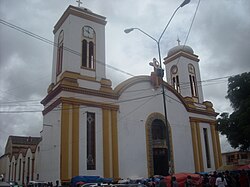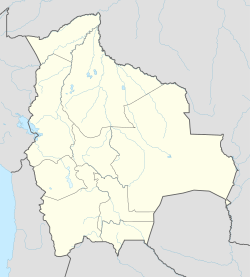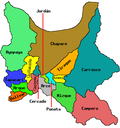Government
The government of Punata Municipality is divided into the executive and legislative branches. The Mayor of Punata is the head of the city government, elected for a term of five years by general election. The legislative branch consists of the Municipal Council, which elects a President, Vice President and Secretary from a group of seven members.
The current mayor of Punata is Leticia Camacho, who has served in that post on an interim basis, since the removal of Víctor Balderrama, who won both of the previous two elections. Balderrama, of the Insurgente Martín Uchu party, was suspended under indictment for aggravated rape of a minor on August 10, 2010 (for which he was convicted September 2011 [2] ), and resigned to resign to allow new elections. A special election for mayor was scheduled to be held on 13 January 2013.
Víctor Balderrama Arias won a strong majority of 74% in the 4 April 2010 elections and his party, Insurgente Martín Uchu, controls five of the seven council seats. [3]
| Date Began | Date Ended | Mayor | Party | Notes |
|---|
| 1992 | 1993 | José Antonio Gonzales Alvarado | Political Accord (MIR–ADN) [4] | |
| 1995 | 1995 | José Antonio Gonzales Alvarado | Revolutionary Left Movement (Bolivia) (MIR) [4] | |
| 1997 | 2002 | José Antonio Gonzales Alvarado | Revolutionary Nationalist Movement [4] | |
| 2004 | | Víctor Balderrama Arias | Insurgente Martín Uchu | Elected with 63% of the vote. Balderrama's first administration was marked by open conflict with the Municipal Council, who sought his removal. Balderrama recognized the alternate members of the Council instead during a crisis in 2007. [5] [6] Meanwhile, the titular council members met in Camacho Rancho for a year, from where they pressed legal demands against the mayoral administration. [7] |
| May 30, 2010 | August 10, 2010 | Víctor Balderrama Arias | Insurgente Martín Uchu | Re-elected with 74% of the vote on 4 April 2010. Suspended August 10, 2010 |
| August 10, 2010 | Interim incumbent, pending special election | Leticia Camacho | MAS-IPSP | |
|
This page is based on this
Wikipedia article Text is available under the
CC BY-SA 4.0 license; additional terms may apply.
Images, videos and audio are available under their respective licenses.





